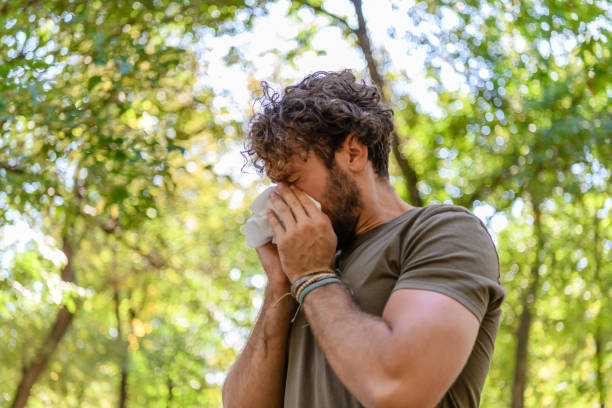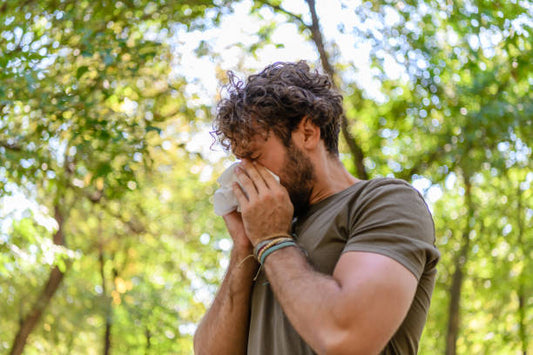Springtime allergies affect an estimated 35 million Americans, with the main trigger being pollen—tiny grains released into the air by trees, grasses and other plants.
When pollen gets into the nose of someone who’s allergic to it, their immune system kicks into high gear by releasing antibodies to attack and kill these invaders. This process releases chemicals called histamines into the blood. These histamines can be blamed for the telltale symptoms associated with allergies: runny nose; itchy, watery eyes; sneezing; wheezing and congestion.
For those who suffer from seasonal allergies, these symptoms can be downright miserable. But this misery spells good news for the pharmaceutical industry, which by some estimates will rake in almost $15 billion by 2015 through the sale of prescription and over-the-counter allergy drugs.1
While many people find symptom relief from allergy medications, these drugs don’t come without their fair of share effects, ranging from mild to serious. The most common side effects include drowsiness, dizziness, stomach upset and blurry vision. Lesser-known side effects include increased appetite and altered taste and smell, as well as sexual dysfunction and depression.
This unpleasant side effect profile has prompted many people to find more natural solutions to cure their seasonal allergy woes. One potential solution that has received lots of attention is honey.
While it may sound strange at first blush, the notion that honey can provide allergy relief is nothing to—pardon the pun—sneeze at.
Why Honey?
Allergies arise from constant, continuous exposure to the same allergens. Eating locally produced honey for allergy symptom relief stems from the idea that the honey can act sort of like a vaccine—exposing your body to tiny amounts of the allergen so that your body builds up an immunity to it.
The theory is this: Bees fly from flower to flower collecting nectar and, in the process, end up covered in pollen spores. These grains of pollen end up being transferred into their honey. Consuming a small amount of this honey—even just one teaspoonful a day—can act as an immune booster and help to minimize your body’s allergic reaction to the pollen.
Hair of the Dog
Treating allergies by exposing yourself to the allergen may seem counterintuitive. But the reason this method seems to work is that you are delivering very small, very manageable amounts of the allergen—via the honey—to your body over time. This allows your body to slowly get used to the allergen so that your immune system doesn’t go into attack mode.
However, in order for this honey remedy to work, it must meet a few key criteria.
- First, the honey must be locally produced. This ensures that the pollen in your area—the spores you are most frequently exposed to—are the ones present in the honey you consume.
- Second, the honey needs to be raw. Once honey is heated (or pasteurized), the pollen spores are killed and the vaccine-like benefits disappear.
- Third, you need to begin “treatment” a few months prior to the start of allergy season.
For instance, if you suffer from springtime allergies that start around April, you should ideally begin eating your spoonful of locally produced raw honey in the early winter months to give your system enough time to build up immunity to the local pollen spores.
What Does the Research Say?
Not surprisingly, well-designed research in this area is fairly scarce. The pharmaceutical industry would not be too thrilled if something as easy, natural and delicious as honey could be used to relieve the same symptoms that their expensive drugs are used to treat.
Fortunately, there are a few studies that show how honey can act as an allergy symptom modulator.
One study published in 2008 looked at bee pollen specifically. Researchers gave daily doses of bee pollen to mice and found that it significantly reduced the activation of mast cells, a class of cells involved in the release of symptom-triggering histamine. The researchers concluded that the anti-allergenic action of bee pollen was caused by the inhibited action of mast cells, “which plays important roles, not only in the early phase, but also in the late phase of allergic reactions.”2
In a more recent study, researchers followed 61 adults who had diagnosed birch pollen allergy. They gave 44 participants either honey with birch pollen added or regular honey. The remaining 17 participants served as the controls, using their usual allergy medication for symptom relief.
The honey-taking participants consumed their respective honey from November through March. From April through May, they recorded their allergy symptoms and their use of medications.
Researchers found that, compared to the control group, the patients who consumed the birch pollen honey had a 60 percent reduction in allergy symptoms, twice as many asymptomatic days, 70 percent fewer days with severe symptoms and a 50 percent reduction in the use of antihistamines. In addition, the birch pollen honey group used fewer antihistamines than the regular honey group.
The researchers concluded, “Patients who preseasonally used [birch pollen honey] had significantly better control of their symptoms than did those on conventional medication only, and they had marginally better control compared to those on [regular honey].” They also stated that birch pollen honey could serve as a complementary treatment for birch pollen allergy.3
Our View
Granted, the research on honey for allergy symptom relief is scarce, but our take is this: If you’re suffering from seasonal allergies, and prescription or over-the-counter medication is either too expensive or has too many bothersome side effects, why not just give honey a try? It’s worth the couple of dollars to support your local beekeeper. Plus, buying locally reduces your carbon footprint.
In addition, purchasing local raw honey ensures that the product is not only safe for you, but also contains the beneficial pollen, which is almost always removed from pasteurized and filtered honeys. A report from Food Safety News states that most honey available in big chain grocery stores contains absolutely no pollen due to filtration and pasteurization processes.
This same report says that dozens of health organizations, including the World Health Organization, have ruled that “without pollen, there is no way to determine whether the honey came from legitimate and safe sources” because there is no way of tracing its origins.4
So, without a shadow of a doubt, buying local and raw honey is the way to go.
With all that said, though, there are a couple caveats to consuming honey on a regular basis.
First, honey can be (ironically enough) an allergenic food for some people. So do not consume honey if you have ever had an allergic reaction to it in the past. And if you are new to honey, use it sparingly in the beginning until you are sure that you can tolerate it.
Also, remember that honey is high in the sugar fructose, which can be problematic if you consume too much of it and have insulin resistance or diabetes. If you have either of these conditions, be sure to keep careful track of your fructose consumption, including honey, fruit and other sweets, and stay within the guidelines set forth by your physician.
References:
- www.prweb.com/releases/allergy_drugs_allergens/allergic_rhinitis/prweb3610254.htm.
- Ishikawa Y, et al. J Med Food. 2008 Mar;11(1):14-20.
- Saarinen K, et al. Int Arch Allergy Immunol. 2011;155(2):160-6.
- www.foodsafetynews.com/2011/11/tests-show-most-store-honey-isnt-honey/#.UQbuvkpFf6k.




